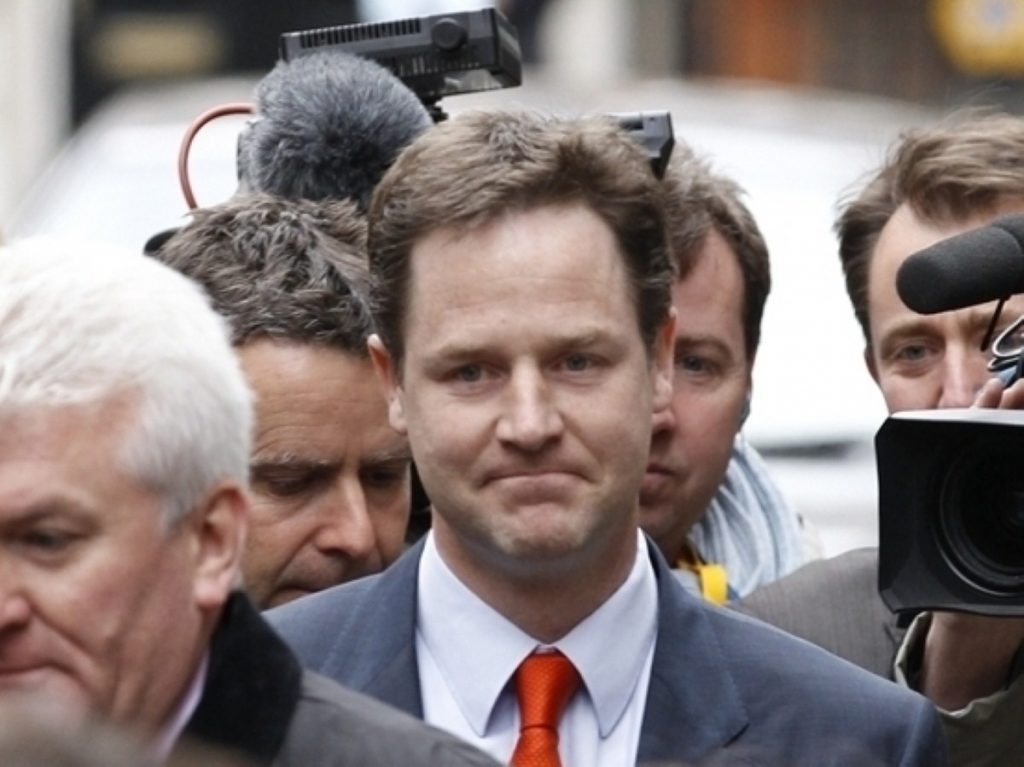Tories offer Clegg referendum on electoral reform
By Ian Dunt and Alex Stevenson
The Conservatives have offered the Liberal Democrats a referendum on electoral reform, as the battle for a coalition with Nick Clegg turned into an all-out bidding war.
The Tory offer was a frantic response to Gordon Brown’s decision to step down as Labour leader today, as both Labour and the Conservatives desperately tried to outbid each other in an attempt to secure Nick Clegg’s support.
Mr Clegg is now in formal negotiations with both parties.


Labour is offering a new leader and a referendum on full proportional representation.
The Tories are offering a referendum on alternative vote, a more limited reform of the voting system.
“I think they’re divided,” a very senior Conservative negotiator told politics.co.uk.
He conceded the Tories’ final offer might not be enough to tempt the Lib Dems into a deal.
“Some of their southern MPs seem to see the sense of a Tory deal,” the source said. “But some of their Scottish MPs, and their more left-wing MPs, can’t stomach doing a deal with a Conservative. So I think they’re torn.”
The Lib Dems would prefer more substantial reform than that offered by the Conservatives, but it remains a hugely significant move by David Cameron’s party which blocked a referendum on electoral reform in the ‘wash-up’ at the end of the last parliament.
Mr Clegg might prefer the more radical reform offered by Labour, but the Conservatives have enough seats for a majority if he gives his support. They will appear the more stable option, a fact emphasised by William Hague outside the Commons this evening.
“In the interests of trying to create a stable and secure government, we will go the extra mile,” Mr Hague said, pledging to offer the Lib Dems a referendum on the alternative vote system.
He said a second unelected prime minister would be “unacceptable to the great majority of people in this country” and said the Tories were “absolutely convinced” this should be avoided.
A Lib Dem MP watching Mr Hague’s statement said: “I won’t be a heckle, he might be a comrade soon.”
He added: “It’s a step further than they wanted to go, so we’ll take that into account.”
The prime minister announced in his resignation statement that the Liberal Democrats are open to formal negotiations with his party, turning coalition talks on their head and throwing Westminster into turmoil.
After Mr Brown made his statement Mr Clegg dropped the strongest hint yet he could go into a Labour-led coalition.
“The talks with the Conservatives have been very constructive and I am grateful to David Cameron and his team for the effort they have put in. But so far we have been unable to agree a comprehensive partnership agreement for a full parliament,” he said.
“We need a government that lasts which is why we believe, in the light of the state of talks with the Conservative party, the only responsible thing to do is to open discussions with the Labour party to secure a stable partnership agreement.
“I think without prejudice to the talks that will now happen between Labour and the Liberal Democrats, Gordon Brown’s decision is an important element which could help ensure a smooth transition to the stable government that everyone deserves.”
The Labour government’s Cabinet is meeting after Mr Brown announced his intention to oversee negotiations – but stand down as leader by September.
The developments have radically shifted perceptions of the most likely government to emerge following last Thursday’s indecisive general election.
The Tory-Lib Dem tie-up had appeared to be gathering momentum, but after the Lib Dems’ 57 MPs met behind closed doors for two hours this afternoon the prospect of a deal appeared diminished.
Speaking after the meeting, Lib Dem negotiator David Laws said more details were required from the Tories education funding, voting reform and fair taxes.
“It is vital that progress should be made on all of these matters in the national interest,” he said.
“Without going into excessive detail, the very clear signal sent out today by our parliamentary party is they believe we must have strong and stable government.”
Lib Dem MPs have been instructed to remain close to Westminster as bargaining with the Conservatives and Labour enters a new phase, with a second parliamentary party meeting possibly taking place this evening.
Colchester MP Bob Russell, a left-leaning Lib Dem, told reporters that “the parliamentary party can take a lot of pride in what’s going on”. But he added: “Life’s full of surprises, isn’t it?”
Sir Alan Beith said the mood was “very good” while Mike Hancock called it “very buoyant”. He said he hoped a decision would be reached by the end of the day. That now seems increasingly unlikely.
The deal on offer from the Tories is understood to ‘confidence and supply plus’.
Such an arrangement would not see the Lib Dems enter a coalition with the Tories, but the party would still support the Conservatives in major votes, like the Queen’s Speech and the Budget. The government would then agree to pass legislation on certain agreed policy areas, such as tax reform.
The markets opened well today, due predominantly to the EU bailout, suggesting dire warnings of financial meltdown in the face of a hung parliament had been over-hyped.
Both Mr Cameron and Mr Clegg have much at stake over the negotiations.
Mr Clegg will never be forgiven if he emerges from this process without having secured a referendum on PR, while Mr Cameron faces a coup against him if he can’t hammer together a coalition, or a minority government.









